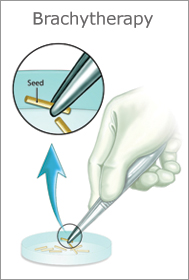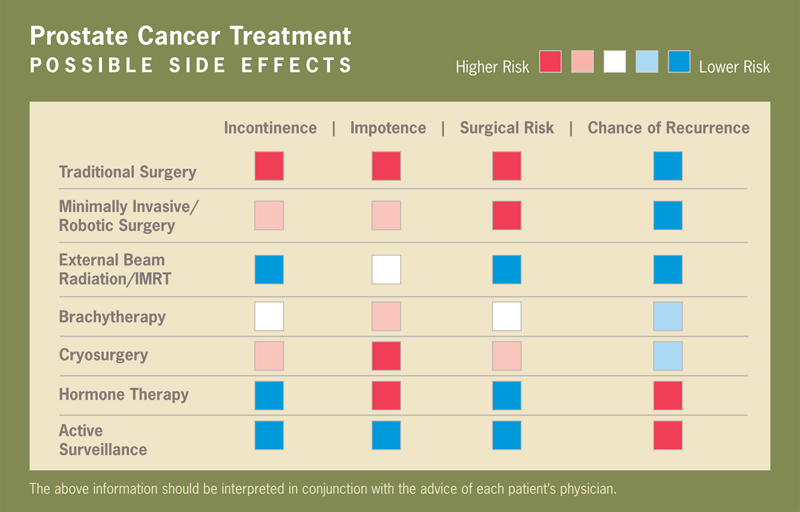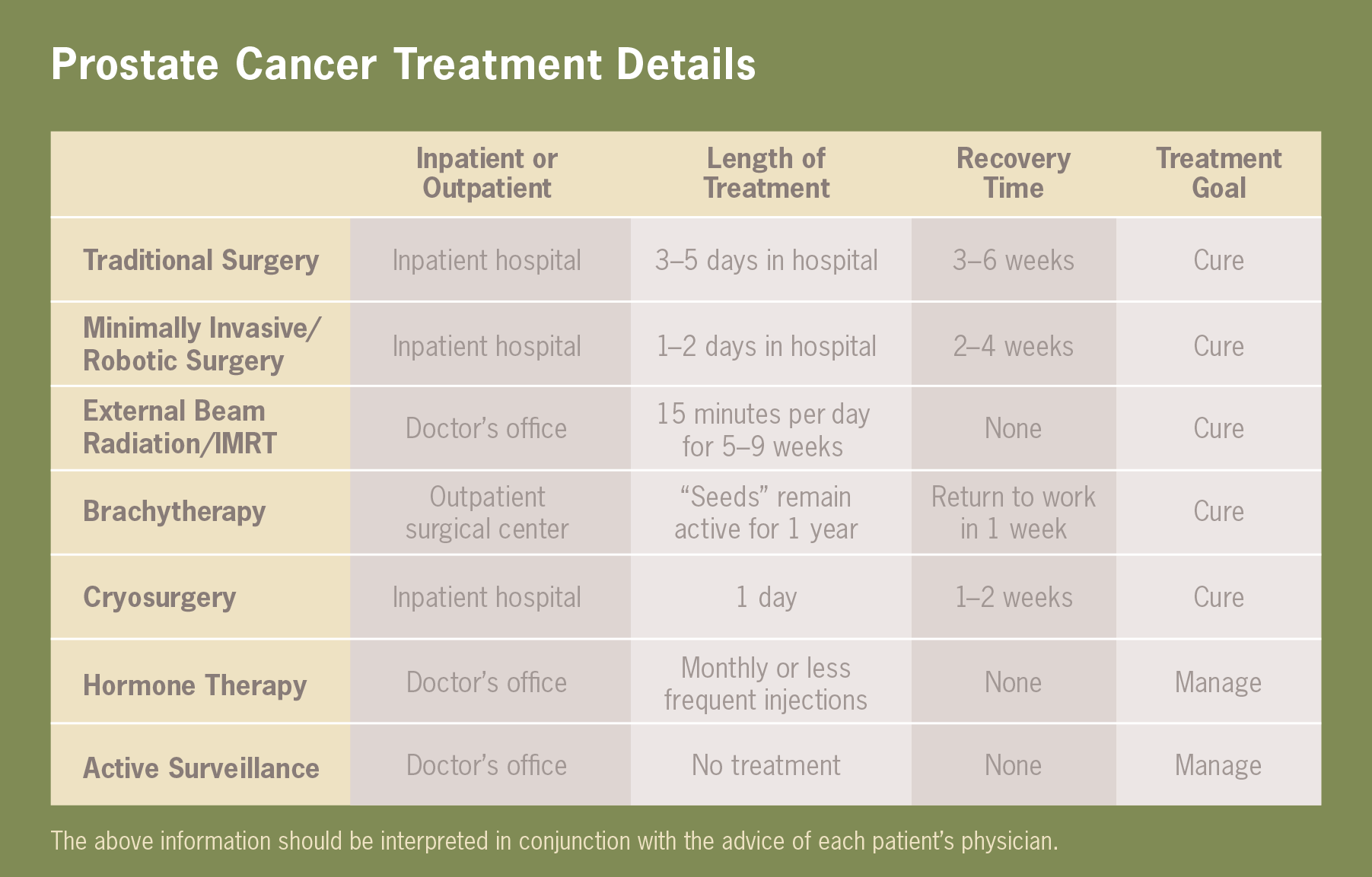Conditions | Prostate Cancer
Prostate Cancer Treatment
Find prostate cancer treatments and radiation therapy services across Western New York.
Prostate cancer is the most common type of cancer among American men.
At Western New York Urology Associates, our urology clinic is well equipped to handle this potentially deadly disease. For over 20 years we have helped more than 10,000 patients throughout Western New York.
With the latest in prostate cancer treatment available, our health care providers have made it their mission to help our patients understand their treatment options and recommend the best course of action, while offering quality care and support during this difficult time.
If you have questions, please contact Western New York Urology Associates for more information on the risk factors and how you can reduce the risk for prostate cancer.
Prostate cancer diagnosis
In the very early stages of prostate cancer, there are usually no symptoms. When symptoms do develop, they depend on the size and location of the tumor. Any symptom should be checked by your physician, to determine the cause. A more common sign of prostate cancer is finding a nodule or abnormality during a routine digital rectal exam (DRE).
Some men also show signs of prostate cancer through a PSA blood test, which measures the prostate-specific antigen (PSA). Based on your PSA level and a digital rectal exam, your doctor may order a prostate biopsy. Click here to download our comprehensive brochure on Elevated PSA.
At Western New York Urology Associates, our urologic pathologists — the scientists who study your biopsy samples — specialize in prostate biopsies, and see a high volume of samples. This experience is extremely important, and helps ensure that you get an accurate diagnosis.
Every positive sample is reviewed by another urologic pathologist, to confirm it truly is prostate cancer. We take this entire process very seriously, because treatment can’t begin until you have an accurate diagnosis.
Learn more about our available prostate cancer treatment options
While there are many different approaches to choosing a prostate cancer treatment, the decision should be discussed between you and your doctor. When it comes to deciding which treatment is right for you, there are many factors to consider including your age, physical health, and how far the cancer has spread.
At Western New York Urology Associates, our professional urologists will take the time to learn the specifics of your situation, and help to make you aware of the risk factors, and possible side effects. It is our goal to help our patients understand their options to find the best choice for their personalized prostate cancer treatment.
Quality, Compassionate Care at Western New York Urology Associates
When you need quality and compassionate healthcare, choose the team at Western New York Urology Associates. Our urologists can offer extensive knowledge on the latest therapies and technology available at our urology clinic. Please continue reading below to learn more about our treatment details.
Download our customizable Prostate Cancer Patient Handbook.
Our most common prostate cancer treatments include:
External beam radiation therapy
Uses high-energy rays to cure cancer. A machine called a linear accelerator creates the radiation beam, which is typically only on for a minute or two per treatment. The actual treatments are completely safe and do not cause you to become radioactive—it is fine for family members and friends to be around you.
External beam radiation includes:
- Intensity Modulated Radiation Therapy (IMRT) — a technologically advanced method of external beam radiation therapy; it conforms to the shape of a tumor and has the ability to allow your doctors to safely deliver a higher dose of radiation to the tumor. For several types of cancer, that means a higher cure rate. Because the radiation is much more targeted, it spares the healthy cells surrounding the tumor and has potentially fewer side effects than conventional radiotherapy techniques. Treatments are typically no more than a couple of minutes long, five days a week, for approximately eight or nine weeks.
- Image Guided Radiation Therapy (IGRT) — allows us to get a picture of the tumor and everything that is around it. IGRT works with external beam radiation, allowing the clinician to make adjustments on a daily basis, and making sure the radiation is delivered as accurately and precisely as possible every time. Ultimately, this prevents excess radiation exposure to your healthy tissue, which minimizes the chance of side effects.
- RapidArc© — an advanced form of IMRT that allows the radiation to better conform to the complex shape of a tumor. This means more radiation goes to the tumor and less to the healthy tissue surrounding it, so it reduces your chances of having side effects. RapidArc is also fast, providing a complete treatment in less than two minutes in many cases. That is because the entire tumor receives the radiation dose with just one single rotation of the machine around the patient. RapidArc’s quick delivery of the radiation dose also means much less radiation exposure to the patient, versus older treatment delivery systems. Most importantly, RapidArc can achieve a high cure rate for several cancers. Our partners at Cancer Care of Western New York have more experience with RapidArc Intensity Modulated Radiation Therapy than any other facility in the area. In fact, our collective experience rivals many major cancer centers around the world, and we have treated more patients than anyone else in the region.
Prostatectomy
Surgery to remove your prostate gland. There are two types: the conventional method and the minimally invasive method. These surgeries are often done during the cancer’s early stages, when the cancer is only within your prostate.
At Western New York Urology Associates, we have performed thousands of these procedures.
- Minimally invasive (robotic) surgery — also called a robotic, laparoscopic or daVinci prostatectomy. In this option, your prostate is removed through a set of tiny incisions made with a robot and microsurgical instruments. The precise surgery protects the delicate prostate nerves, which control the bladder and sexual function. That means patients typically have faster recoveries, shorter hospital stays, less pain and faster return of urinary control. The surgeons at Western New York Urology Associates were among the first to offer this treatment and have performed this less invasive procedure with excellent results on hundreds of patients.
Click here to download our comprehensive brochure on Robotic Prostatectomy
- Conventional surgery — also called a traditional, open or conventional prostatectomy. During this procedure, a vertical incision is made in your lower abdomen. Your surgeon removes your prostate gland and, depending on how much your cancer has spread, may also remove surrounding lymph nodes.
Brachytherapy
A minimally invasive procedure that places radioactive seeds directly in your prostate gland to destroy the cancer cells. These radioactive seeds will emit low-level radiation for about one year.
During this outpatient procedure, which is performed by your urologist and radiation oncologist, you will receive a general anesthetic. An ultrasound guide will be placed into your rectum. Then approximately 20 needles will be placed through the skin between your scrotum and your rectum.

Hormone therapy
Also known as androgen deprivation, hormone therapy is designed to lower the level of testosterone, a hormone produced in the testicles that causes prostate cancer to grow. Lowering the level of testosterone can cause prostate cancer to shrink, or grow at a slower rate. While hormone therapy does not cure cancer, it can extend—and improve—your quality of life when it is used along with other therapies.
Cryosurgery
A procedure that freezes the prostate gland under controlled conditions, in an attempt to cure cancer. While this treatment option is not widely utilized, it is occasionally employed—mostly for cases where other treatment methods have failed.
Book a urology appointment today
For more information about any of our prostate cancer treatment services, please contact us.


